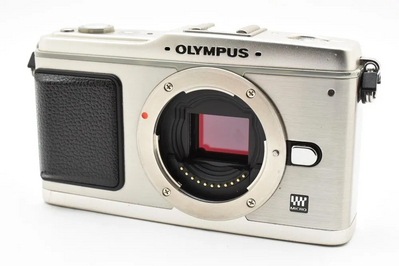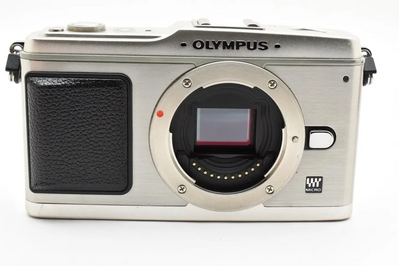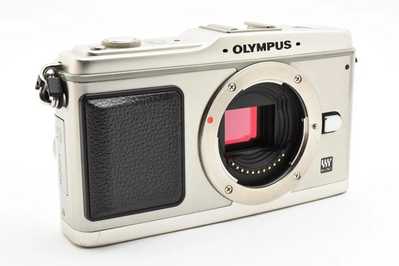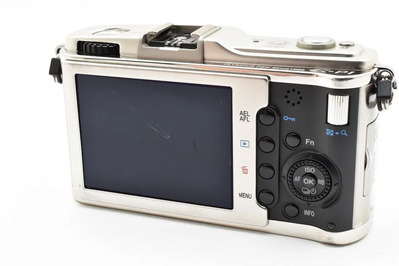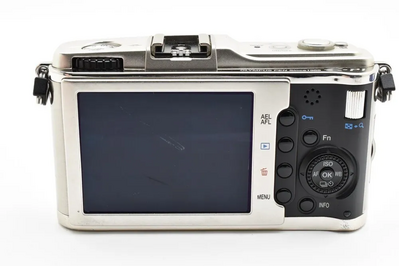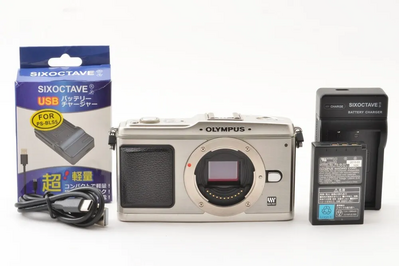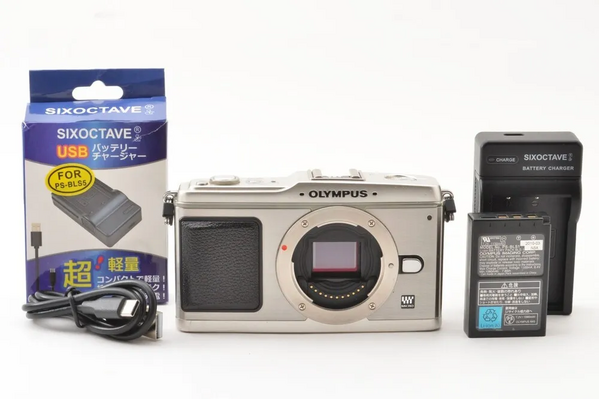
Olympus Pen E-P1
| Brand | Olympus 2009 |
| Model | E-P1 |
| Released Year | 2009 |
| Type | Digital Cameras |
| Series | Pen |
| Color | Silver |
| Autofocus | Contrast-detection |
| Status | Discontinued |
Quick view
Overview
The Olympus Pen E-P1 is a mirrorless interchangeable lens camera introduced in 2009, marking Olympus's entry into the Micro Four Thirds system.
It features a 12.3-megapixel Live MOS sensor that delivers high-resolution images with excellent detail and color accuracy.
The camera supports an interchangeable lens mount compatible with a broad range of Micro Four Thirds lenses, offering versatility for various shooting scenarios.
The E-P1 incorporates a compact, retro design inspired by the classic Pen film cameras, providing a lightweight and portable form factor without compromising durability.
Its autofocus system is contrast-detection based and provides reasonably quick and accurate focusing for still photography.
Additionally, the camera offers HD video recording capabilities, manual controls, and multiple exposure modes, making it suitable for enthusiasts and advanced amateurs.
Specifications
| Series | Olympus PEN |
| Type | Digital SLR |
| Maximum Resolution | 12.3 MP |
| Color | Silver |
| Model | Olympus PEN E-P1 |
| Connectivity | HDMI, USB 2.0 |
| Charger Included | Yes |
| Country/Region of Manufacture | Japan |
| Battery Type | Lithium-Ion |
| UPC | N/A |
| Sensor Type | Live MOS |
| Sensor Size | 17.3 x 13.0 mm (Micro Four Thirds) |
| Megapixels | 12.3 |
| Lens Mount | Micro Four Thirds |
| ISO Range | 100 - 3200 |
| Autofocus | Contrast-detection |
| Video Recording | HD 720p |
| Rear LCD | 3.0 inch fixed screen |
| Continuous Shooting Speed | 3 fps |
Images
Key Advantages
The Olympus Pen E-P1's compact size and lightweight design make it highly portable for everyday and travel photography.
Its Micro Four Thirds sensor balances image quality and sensor size, providing sharp and vibrant photos.
The interchangeable lens system provides flexibility for various photography styles and creative expression.
The camera's retro aesthetic appeals to users looking for a classic yet modern digital camera experience.
Manual controls and customizable settings offer advanced users greater control over image capture.
It also supports HD video recording, expanding its versatility beyond still images.
Limitations
The autofocus system, being contrast-detection only, can be slower compared to phase-detection autofocus in some situations.
Battery life is relatively limited, which may require carrying spare batteries for extended use.
The rear LCD screen lacks articulation, limiting shooting flexibility from various angles.
The camera does not include a built-in electronic viewfinder, which can make composing shots in bright sunlight difficult.
Video recording capabilities are limited to 720p HD resolution, which is lower compared to newer models.
Continuous shooting speed is modest, which might not suit fast-action photography needs.
FAQ
What sensor does the Olympus Pen E-P1 use?
The Olympus Pen E-P1 uses a 12.3-megapixel Live MOS Micro Four Thirds sensor.
Is the Olympus Pen E-P1 compatible with all Micro Four Thirds lenses?
Yes, the E-P1 supports interchangeable lenses designed for the Micro Four Thirds system.
Does the Pen E-P1 have a built-in viewfinder?
No, the Olympus Pen E-P1 does not include a built-in electronic viewfinder.
Can the Pen E-P1 record video?
Yes, it can record HD video at 720p resolution.
Is the Olympus Pen E-P1 still in production?
No, the Olympus Pen E-P1 was discontinued several years ago.
What is the maximum ISO sensitivity of the E-P1?
The maximum ISO sensitivity is 3200.
Does the Pen E-P1 have image stabilization?
No, the E-P1 does not have in-body image stabilization.
Disclaimer
The content on is provided for general informational purposes only. We do not guarantee the accuracy, completeness, or reliability of any information, specifications, or visuals presented on the site.
is not responsible for any content, images, or data uploaded or shared by users. Users are solely responsible for the content they submit.
We may include links to third-party websites for convenience. We do not endorse or take responsibility for the content or policies of any external sites.
Use of the site is at your own risk. Always verify critical information independently before making decisions based on content from this website.

